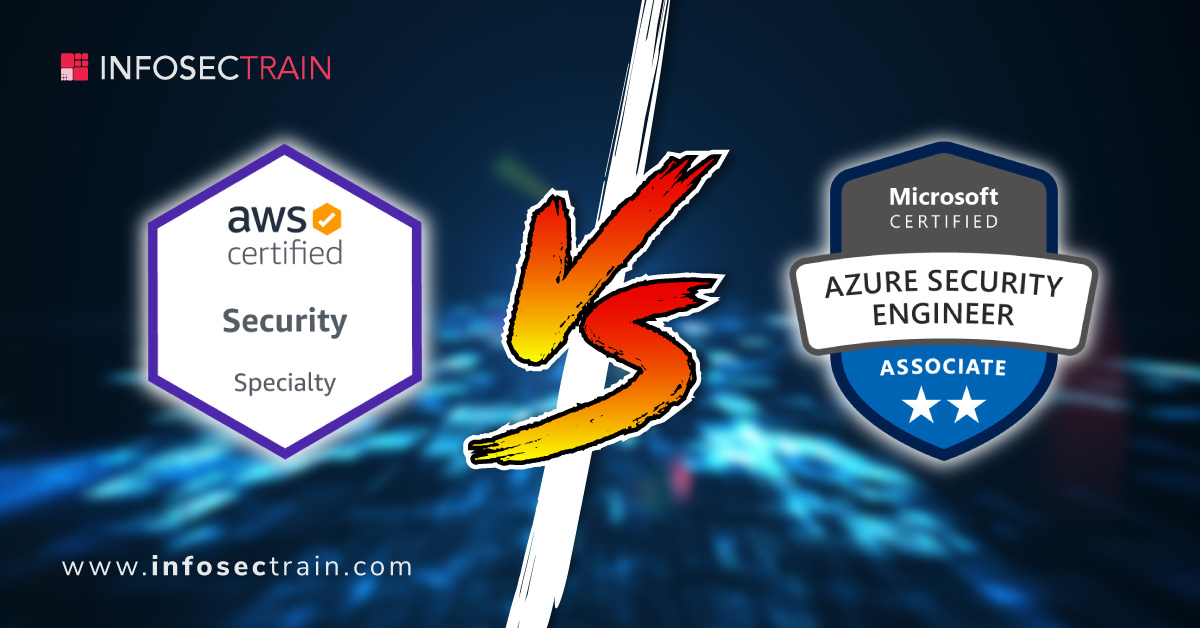Cloud Security Comparison: AWS Security vs Azure Security
Amazon Web Services (AWS) and Microsoft Azure are the top cloud players. Let’s take a tour of the comparison of cloud security for AWS and Azure i.e AWS Security vs Azure Security.

The most critical doubt that holds back many enterprises from arriving at the decision to move to the cloud is security. However, the security infrastructure on public cloud platforms such as AWS and Microsoft Azure provides the assurance for safeguarding sensitive data of enterprises. As the adoption of cloud computing increases, the emphasis on cloud security is increasing prominently.
In addition, the debate on AWS Security vs Azure Security is a major concern that determines the difference between the two public cloud platforms. It is highly essential to compare the security infrastructure of both the prominent public cloud service providers. The comparison can help in finding the ideal cloud platform that aligns with your cloud security requirements.
AWS Security vs Azure Security – A Comparison
The comparison of AWS Security vs Azure Security should primarily focus only on the services in different aspects of cloud security. The noticeable areas to consider for the comparison of AWS vs Azure services in terms of security are identity and access management, key-based data encryption, storage data encryption, virtual private network, and monitoring.
Identity and Access Management
Identity and access management is a significant aspect of cloud security from a customer’s perspective. However, Azure cloud security and AWS cloud security have completely different approaches to identity and access management. Microsoft has extended its legacy identity manager, the Active Directory, from Windows to Azure. The Azure AD comes with a free tier having certain data limits and three distinct paid tiers.
The paid tiers of Azure AD accompany advanced features such as abilities for the management of hybrid environments. On the other hand, AWS offers cloud-centric IAM exclusively without incurring additional charges. The in-built IAM in AWS supports the effective management of cloud environments. However, it has to integrate with other on-premises tools such as Active Directory for achieving its functionality.
Key-Based Data Encryption
The AWS Security vs Azure Security comparison in terms of key-based data encryptions brings Amazon KMS and Azure Key Vault into question. Both these tools offer data encryption at rest as well as in transit. In addition, both tools can also support key management. However, you would need total control over the encryption and management of keys in certain cases.
You can respond to such cases with the help of a Hardware Security Module (HSM). In the case of Azure, you can find the HSM in-built with Key Vault. On the other hand, the KMS service and CloudHSM service are separate on AWS. The positive side in this aspect is that pricing is almost similar on both Azure and AWS.
Encryption of Storage Data
Another important aspect of cloud security comparison is the encryption of stored data. Object data encryption is a very critical component of cloud security and is a profound determinant in the selection of a cloud platform. The Simple Storage Service (S3) on AWS and Blob on Azure provide the cloud storage services and support encryption of data with keys.
Azure doesn’t have support for allowing customers to manage keys although the feature would arrive soon. On the other hand, AWS provides the exclusive option for allowing AWS to manage your keys or choose to manage your keys personally. Therefore, AWS definitely presents better control over cloud security in comparison to Azure for storage data encryption.
Virtual Private Network (VPN)
The importance of Virtual Private Network (VPN) in the AWS Security vs Azure Security comparison is evident due to its role in data encryption. VPN is an ideal instrument for access a private network for data transfer between a public cloud and a data centre. The virtual private network ensures encryption of data as it moves across the internet, thereby offering exceptional data security.
AWS Virtual Private Cloud (VPC) and Direct Connect are the two services to enable virtual private networks. On the other hand, Azure has two similar services such as ExpressRoute and Virtual Network, for creating a VPN. The difference between AWS and Azure Security in this aspect is that AWS uses layer 2 routings while Azure uses layer 3 routings.
Monitoring
Monitoring is a highly critical tool for enforcing security in the cloud. Cloud security has to focus on cloud services as well as the applications they support. AWS CloudWatch provides the monitoring functionality to enforce cloud security. CloudWatch ensures integration of services and application monitoring.
On the other hand, Azure Monitor provides services monitoring and application monitoring distinctively. Azure Monitor can track all Azure services while Azure Application Insights can monitor running applications. The features offered by Azure and AWS in terms of monitoring are almost similar, although with a difference in the organization of features.
Are You Ready to Make a Choice?
So, now you can make your decision based on the above-mentioned factors. You can opt for Azure if you want limited hassles and formidable backward compatibility. On the contrary, if you want better control and access to innovation, then AWS would be the right pick.
Although the learning curve is steeper with AWS, you can access functionalities for better customization and control. Make your choice after thorough research and achieve your cloud security objectives!
If you would like to get certified in AWS Security or Azure Security do contact us today for more on this!








 1800-843-7890 (India)
1800-843-7890 (India)